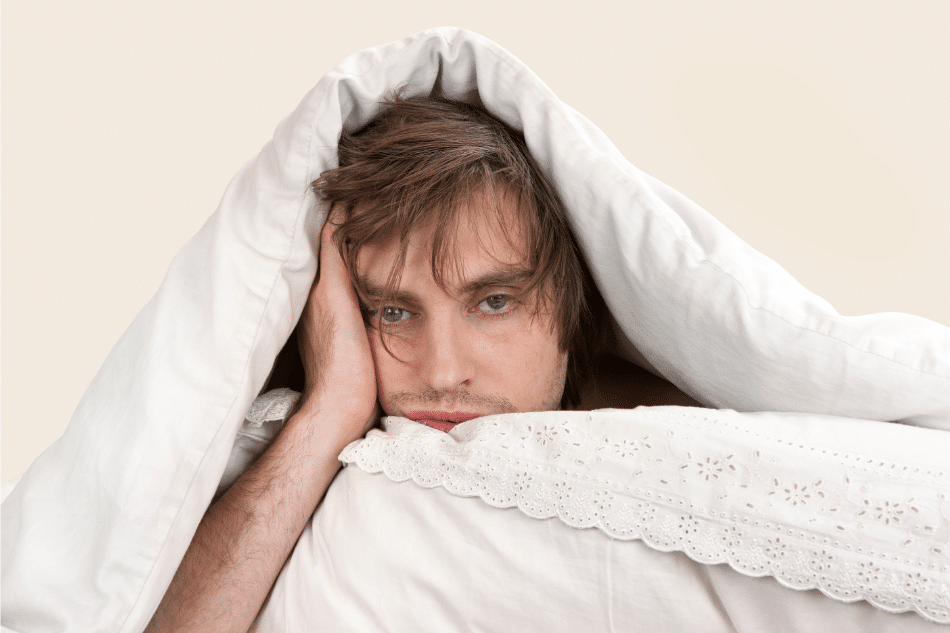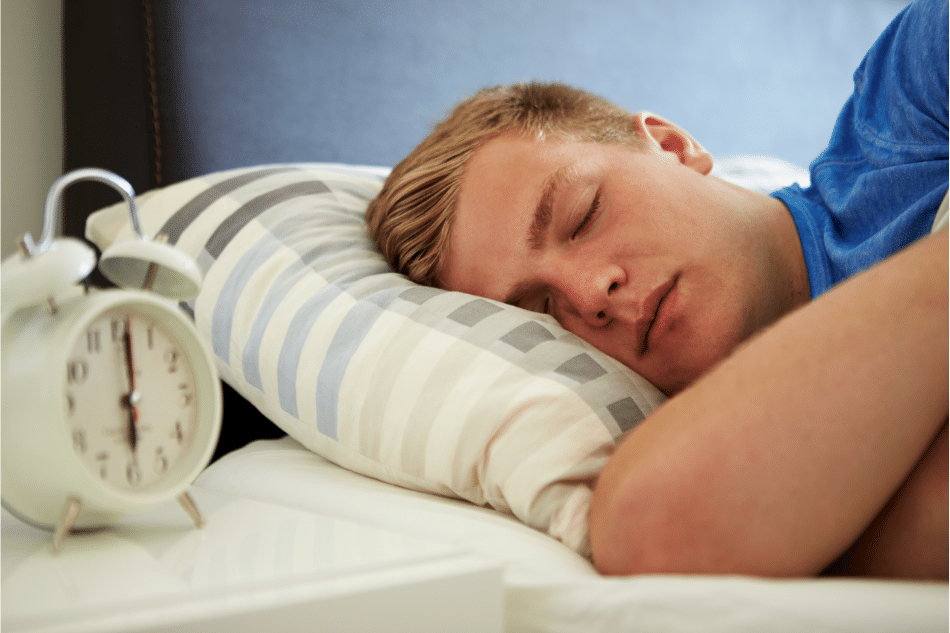Sleep Deprivation in Teens: Warning Signs, Causes, and Ways to Recover

However, it’s not just screens that are to blame for a lack of sleep. Many teens struggle with mental health conditions, sleep disorders, lifestyle factors, or neurological conditions that disturb normal sleep patterns.2
When left untreated, sleep problems can significantly affect teens’ mental and physical well-being. For instance, high blood pressure, obesity, burnout, lower immune system function, and a deterioration of academic performance all can result from chronic fatigue.2,3
The risks of chronic sleep deprivation to physical and mental health make diagnosing its causes crucial. Mental health professionals are at hand to help, but this page can also guide you through teen sleep deprivation by considering:
What sleep deprivation is and its different causes- The range of ways teens can be impacted by issues with sleep
- Teen mental health and sleep deprivation
- How healthcare professionals approach teen sleep deprivation treatment
- How caregivers can help treat teen sleep deprivation at home

What Is Sleep Deprivation?
Sleep deprivation is when someone sleeps for less than the optimal time, which is between 8 and 10 hours per night for teenagers. Aside from sleep duration, sleep deprivation can also be caused by low-quality sleep. Low-quality sleep can arise from a range of factors relating to poor sleep hygiene.2
While someone might occasionally experience less sleep than they’d like due to short-term stress or loud neighbours, this isn’t usually problematic. In contrast, sleep deprivation is when there’s a chronic lack of sleep lasting for weeks or months on end. It becomes problematic when someone’s physical, emotional, or cognitive functioning is impaired, impacting their quality of life.1
Due to this effect on quality of life, sleep deprivation should be treated swiftly. Not only can constant fatigue increase the risk of accidents and injuries, but it’s also associated with conditions like obstructive sleep apnea, diabetes, high blood pressure, obesity, anxiety, and depression. It also puts people at greater risk of strokes and heart attacks.1
With that information in mind, we’ll now explore some of the potential causes of teen sleep deprivation, as well as why this age group is at greater risk.
Why Teens Can Have Sleep Problems
This circadian shift can also cause more wake-ups at night, reducing the amount and quality of sleep that teens are getting and resulting in reduced performance in waking hours.2
Aside from the natural circadian rhythm shift, there are other causes of sleep deprivation, including:
Sleep apnea- Insomnia
- Obesity
- Restless leg syndrome
- Periodic limb movement disorder
- Chronic Fatigue Syndrome
- Narcolepsy
- Hypersomnia
- Anxiety and increased cortisol levels
- Depression
- Parasomnias (such as sleep talking, sleepwalking, nightmares, sleep paralysis, and night terrors, among others)
- Early school start times
- Having a big workload at school
- Social media usage
A sleep deficit can also be caused by late-night TV and mobile phone use. In fact, many electronic devices can be guilty of disrupting our sleep. Research finds that blue LED light suppresses our bodies’ production of melatonin, an essential hormone in getting us to sleep at our natural times. Therefore, reducing exposure to artificial light from electronic gadgets may be an essential part of treating sleep deprivation.3
Based on all these factors, the typical image of a teen staying up late is a stereotype for good reason. However, this doesn’t mean teens should accept sleep problems as an inevitability and struggle through them unnecessarily.
How Poor Sleep Affects Teens
As mentioned, poor sleep and sleep deprivation can have significant impacts on the quality of a teen’s life, health, happiness, and performance. Warning signs of sleep deprivation in the early stages include:
- Daytime sleepiness
- Poor concentration
- Fatigue
- Impaired memory
- Moodiness
Beyond the initial stages of sleep deprivation, the impacts can become more serious. For instance, teens might experience burnout from no sleep, which is a total exhaustion of their emotional, mental, and physical capabilities. To heal properly from burnout, a teen must withdraw from their obligations and rest. In doing so, it may only take a couple of days to one week to heal from burnout.
Sleep and emotional regulation are closely linked, which brings us to our next, more serious set of impacts of lack of sleep – difficulty regulating emotions. Due to a lack of sleep or poor quality sleep, a teen might become tearful or angry more quickly than normal because their fuse is much shorter. Eventually, this effect can cause teens can become more stressed and develop anxiety or depression.2
Another serious set of effects caused by sleep deprivation is weight gain, diabetes, and obesity. Research suggests that chronic sleep deprivation increases cravings for carbohydrates, so when someone isn’t sleeping well, increasing food intake to compensate for feeling tired is common.3 Unfortunately, this can result in weight gain and unhealthy eating habits.5
Treating Sleep Deprivation
The serious impacts of sleep deprivation make treatment essential. Fortunately, there is a wide range of things you can do at home to improve your teen’s sleep hygiene. Plus, there are many things healthcare providers can do to diagnose and treat poor sleep.
Treating sleep problems usually involves three components. These are:
- Modifying sleep behaviors and sleep hygiene
- Treating medical and psychiatric conditions causing the sleep issue
- Medication
However, if your teen’s sleep loss is caused by a condition like obstructive sleep apnea, they’ll likely be treated with a CPAP (continuous positive airway pressure) machine. Weight loss may also be recommended based on their circumstances.1
Additionally, there’s a range of medications in the US that can help with sleep. It’s important to learn about the side effects of these medications, as some can lead to dependence or a range of other side effects. Many teens won’t need to take sleep medication if their sleep difficulties are caused by lifestyle and environmental stressors.
At home, you can support your teen in a range of ways. For instance, helping them to limit their use of electronic devices before bed and engage in more physical activities can significantly improve sleep hygiene.2 They should also avoid daytime naps, have regular bedtimes and wake times, and avoid consuming caffeine, nicotine, and alcohol in the few hours before bedtime.5 Your teen may also benefit from herbal supplements (like synthetic melatonin) or practicing meditation and body relaxation techniques.5

Mission Prep: Get Support For Sleep Deprivation Today
Research finds that, for people who have had restricted sleep for six nights, only three nights of recovery sleep are needed to see cortisol and fatigue levels return to baseline.5 So, when it’s finally achieved, recovery from sleep deprivation can be quick. Yet many teens and families may struggle to figure out how to get started with healthier sleep patterns.
At Mission Prep, we understand how things like mental health, sleep, and academic stress can compound and cause significant distress to teens and their families. Our team can provide a range of options to help, including CBT, EMDR, inpatient and outpatient services, and sleep therapy for teenagers. We offer personalized treatments that take into account each teen’s unique set of difficulties, goals, and preferences.
If sleep deprivation effects in teens are a concern, our empathetic team is always available. Get in touch to learn about our treatment options today.
References
- Amin, F., & Sankari, A. (2023, July 25). Sleep insufficiency. PubMed; StatPearls Publishing. https://www.ncbi.nlm.nih.gov/books/NBK585109/
- Hanson, J. A., & Huecker, M. R. (2023, June 12). Sleep deprivation. PubMed; StatPearls Publishing. https://www.ncbi.nlm.nih.gov/books/NBK547676/
- Johri, K., Pillai, R., Kulkarni, A., & Balkrishnan, R. (2025). Effects of sleep deprivation on the mental health of adolescents: A systematic review. Sleep Science and Practice, 9(1). https://doi.org/10.1186/s41606-025-00127-w
- Madan Jha, V. (2023). The prevalence of sleep loss and sleep disorders in young and old adults. Aging Brain, 3, 100057. https://doi.org/10.1016/j.nbas.2022.100057
- Seton, C., & Fitzgerald, D. (2021). Chronic sleep deprivation in teenagers: Practical ways to help. Paediatric Respiratory Reviews, 40(40). https://doi.org/10.1016/j.prrv.2021.05.001













